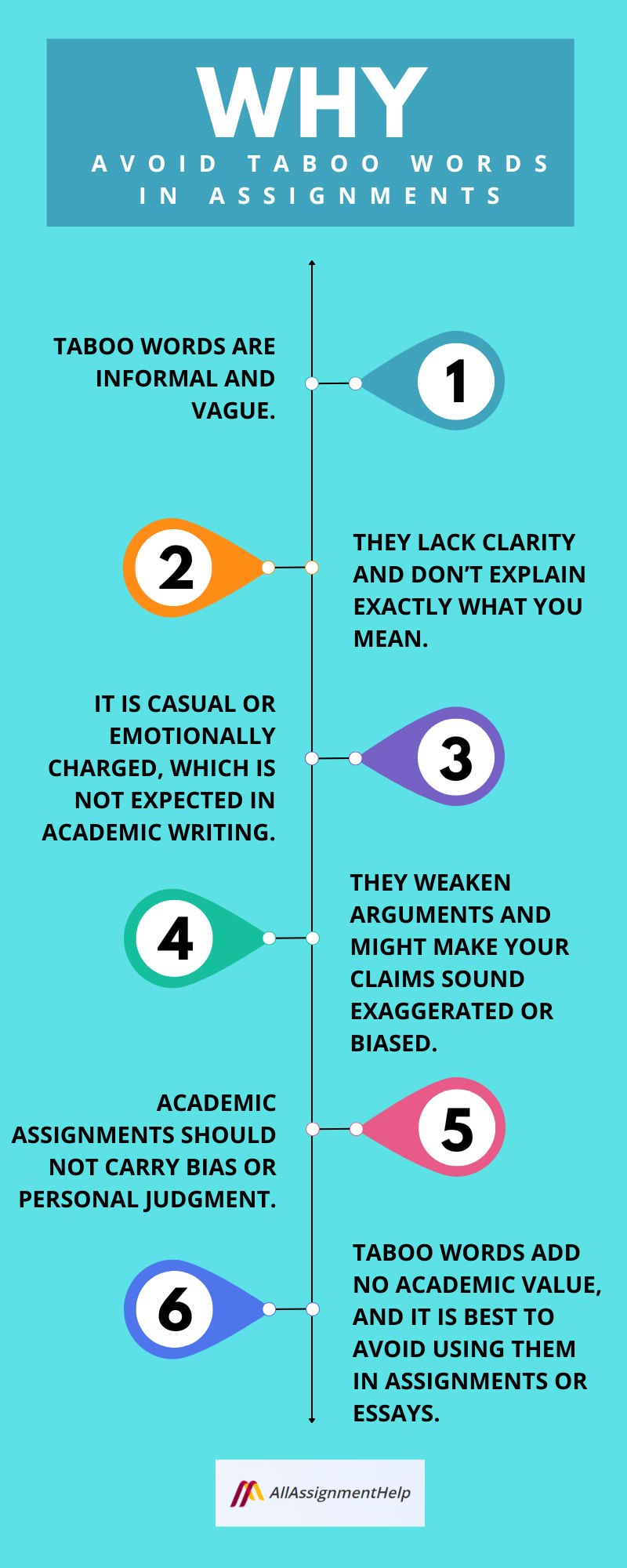Table of Contents
Different form of writing serve different purposes. The main purpose of academic writing is to educate students. Professional writing’s purpose is to support business’s growth. For technical writing, it aims to simplify complex information. Professional and technical writing are somewhat similar in the purpose of writing in the workplace. Academic writing is completely different. Different things matter when writing for academic purposes. It should be well-structured, crystal-clear, and use formal language; do not allow informal writing. Vague, informal, taboo words should never be a part of it.
The taboo words list does not come under academic disclosure. In this blog from All Assignment Help, our main aim is to help students learn more about the difficult taboo words and ways to avoid them in their writing.
What Are Taboo Words?
“Taboo” is a word something we all might have heard. But do you know taboo words’ meaning? It refers to expressions, phrases, and specific words that are not formal. This language is not acceptable everywhere. One may use these taboo words in casual conversation or writing. However, it should never be used in academic writing.
A taboo is something that is “explicitly banned on the grounds of social traditions, taste, religious convictions, or other such categories.” In short, terms and phrases that are banned in academic writing are those whose use is discouraged in the text. There are a number of explanations for why certain terms are regarded as “taboo.” But most noticeably, it’s because they give scholarly texts a feeling of haziness and ambiguity. This goes against the very nature of academic writing because such texts appear less clear-cut and exact, leaning more toward the “informal” side.
Expressions and phrasal verbs that are excessively casual, subjective, hazy, simple, overstated, or even other expressions that may be deemed unneeded and wrong are examples of taboo word types. When writing assignments, students are advised to be extra careful. Always avoid using these word categories unless they are explicitly obtained from a source. Moreover, students who don’t have any prior knowledge about taboo words can seek assignment help. Professional experts have expertise in academic writing. They can meet the standards of academic tone with top grades. Guarantee.
Why Avoid Taboo Words in Assignments
Taboo words should always be avoided in academic work. Whether it is assignments or research papers, you should never include taboo words. Here is why you should avoid using it in academic writing.
- Taboo words are informal and vague.
- They lack clarity and don’t explain exactly what you mean.
- It is casual or emotionally charged, which is not expected in academic writing.
- They weaken arguments and might make your claims sound exaggerated or biased.
- Taboo words add no academic value, and it is best to avoid using them in assignments or essays.
Also Read: An Essay on Action Speaks Louder than Words
Taboo Words To Avoid in Academic Writing
Academic writing is a form to showcase your knowledge. If you are writing an biology assignment or a nursing assignment, you must know how to use the right words to make your assignment stand out. It is the only way to score well. However, you may consider seeking nursing assignment help or getting help with biology assignment to score well. But if you are writing an assignment on your own, you should never use taboo words. These are considered to be informal, and you may lose your grades because of it.
To maintain the formality of academic assignments, always avoid taboo words. Here we have provided a list of taboo words that should be avoided.

Too Informal
Academic assignments are formal. Essays and research papers should always maintain a formal tone as compared to webpages and blogs. Writing for academic purposes is typically more formal than writing for other purposes. The words that are deemed informal should not be used in academic writing.
With the taboo words list below, get a clear understanding of what is informal and what should not be used in an academic assignment like a dissertation.
What to avoid: a bit, a lot of, a couple of, kind of, isn’t it, sort of, can’t, would’ve, plus, anyways, to be honest
Why to avoid: This will make the sentence look weak, or we can say that it won’t be appealing to the readers.
What to use instead: Difficult, several, many, is not, somewhat, to
Example:
- The mathematics problem was a bit difficult to solve.
- The mathematics problem was somewhat difficult to solve.
Too Vague
Vague and generalized words also come under the category of taboo words. Vague words lack specificity or precision. On the other hand, in academic writing, clarity and accuracy are essential. These two things are complete opposites and should not be merged with each other.
Using vague words will make your thoughts unclear. It might be difficult for readers to understand the exact meaning of your viewpoint.
What to avoid: stuff, thing, some, people, a while, good, important
Why to avoid: It might make your claims unclear, confusing the readers.
What to use instead: materials, factors, a few, several, significant, minimal
Example:
- There are many valuable things in my bag
- I have my laptop and mobile phone in my bag
Too Exaggerate
Simple, non-adjective writing is preferred in academic writing. Exaggeration, particularly when using adverbs such as frequency, superlatives, and intensifiers, should be avoided. Even though such remarks are commonly misinterpreted, they occasionally have worth. In assignments, one should not make any claims that are not accurate. Always avoid emotional or exaggerated language in sentences.
What to avoid: always, amazing, awesome, terrible, perfect, never
Why to avoid: These words lack academic neutrality. Hence, it should be avoided in assignments
What to use instead: frequently, an ideal solution, significant
Example:
- I think this would be a perfect solution to her problem
- I think this would be an ideal solution to her problem
Too Subjective
Avoid being subjective in academic assignments unless instructed by your instructor. First- and second-person pronouns should be avoided. It is best to use passive voice indeed.
What to avoid: I think, I believe, good, bad, awful, should, must, obviously
Why to avoid: Academic assignments should not carry bias or personal judgment.
What to use instead: It can be argued, the evidence supports, is beneficial, problematic, challenging, is recommended, it is necessary
Example:
- I think this learning tool is not suitable for students
- Studies suggest that each student is different, and a single learning tool might not be suitable for all.
It is advised for students to use less biased language in their assignments. Moreover, if you don’t know how to use taboo words or lack the knowledge to complete your online coursework, get help online. A simple inquiry of can someone do my online course? would be enough for you to get help. With this simple query, hire professional online experts. They will complete all your online coursework as per the university standards.
Commonly Incorrect Words
Even native speakers may misuse some common words and phrases. It is common to believe those errors are accurate once you have encountered them frequently. They are among the don’ts of academic writing; therefore, you should be careful not to incorporate them into your writing process.
These words are grammatically incorrect and are unclear in nature. Therefore, such words should always be avoided in academic assignments.
What to avoid: really, literally, basically
Why to avoid: They are informal and not suitable for formal academic writing.
What to use instead: There are no alternatives for these words. It is better to omit them in assignments.
Example:
- I have literally explained this problem five times, but she could not understand it.
- I have explained this problem five times, but she could not understand it.
Also Read: Guide to Transition Words for Stronger Body Paragraphs & Conclusions
Hyperbolic Words and Phrases
These are also considered taboo words and should not be used in academic writing. Hyperbole can be powerful in creative writing, but it is said to be inappropriate in academic writing.
What to avoid: enormous, revolutionary, unbelievable, life-changing
Why to avoid: Any words that are superlative without evidence should be avoided.
What to use instead: substantial, innovative, unexpected, influential
Example:
- My chemistry experiment was a total failure
- My chemistry experiment did not yield the expected results
Not Sophisticated
Unsophisticated words will weaken your message. Hence, it should be avoided in assignment writing. It makes sense to use their equivalents in place of such straightforward words.
What taboo words to avoid: kind of, sort of, very, okay, alright
Why to avoid: These words don’t reflect the formal tone that is expected in academic assignments.
What to use instead: somewhat, moderately, extremely
Example:
- This movie is kind of interesting; I liked it.
- This movie is intellectually interesting and captivating.
Using lengthy and complex terms will not make your writing better. A good academic paper should use a variety of words and be brief and to the point. Moreover, it should follow a formal tone and should not express a casual or conversational tone. You should be extra careful of taboo words when writing assignments in psychology. Such assignments are entirely theory-based. It should maintain a clear, professional, and scholarly tone. You can simplify the entire assignment writing process by hiring professional a psychology assignment helper. They can provide you with the best assignments, omitting all taboo words. High-quality paper will easily fetch you top grades.
Other Taboo Words to Avoid in Assignments
In addition to these taboo words, there are others as well that are considered taboo. Students, when writing exams or assignments, should keep these in mind. Any mistake and you may lose your grades. If you don’t want to risk your grades, then seek help from online experts. You can hire professional online exam helpers with a simple inquiry, such as, can someone take my online exam?” Moreover, you can also get help with assignments from professional experts.
The other examples of taboo words are
- Contractions like “can’t,” “won’t,” “isn’t,” “don’t,” “it’s,” and “there’s” should be avoided in assignments.
- Slang like “kind of,” “sort of,” “a lot,” “cool,” “big deal,” “get rid of,” “stuff,” and “thing” should also be avoided.
- Never use idioms like at the end of the day, hit the nail on the head
- Avoid using phrases like “in order to” and “due to the fact that.”
There are other alternatives to these words, and it is advised to use them instead of taboo words.
Also Read: Simple Yet Significant Things to Remember About Transition Words for Compare and Contrast Essay
Frequently Asked Questions
Question 1: What are taboo words?
Answer: A taboo is something that is “explicitly banned on the grounds of social traditions, taste, religious convictions, or other such categories.”
Question 2: Are there any good taboo words?
Answer: Taboo words are often considered to be vague or too informal. It can be used, but not in formal academic writing.
Question 3: What are examples of taboo words?
Answer: “Stuff,” “gonna,” “want to,” “I think,” and “I believe” are some of the examples of taboo words.
Question 4: Why are swear words considered taboo?
Answer: They are emotionally charged and offensive in nature. Vulgar language, or curse words, is not accepted in formal writing.
